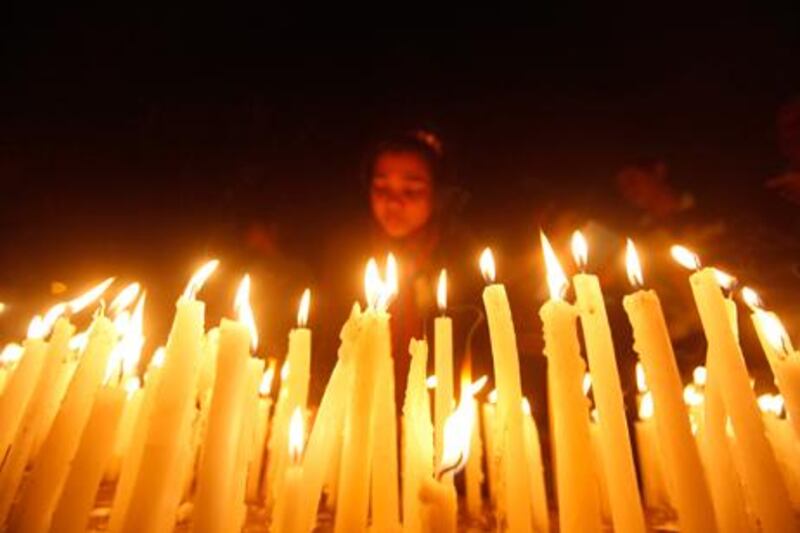NEW DELHI // Thousands of Indians joined protests yesterday in a mass outpouring of grief and anger after the gang-raped student died in a Singapore hospital.
The prime minister, Manmohan Singh, called for calm and the protests passed off peacefully but he said it was up to the country as a whole "to ensure that her death will not be in vain".
As news of the 23-year-old physiotherapy student's death reached New Delhi early yesterday, hundreds of policemen sealed off the high-security India Gate area in anticipation of more protests.
The area had seen battles between protesters and police for days after the December 16 attack. A crowd of about 1,000 gathered at Jantan Mantar, New Delhi's officially sanctioned venue for protests, with Indians demanding an end to sexual violence against women.
"The rape of this girl and the trauma she experienced is not new and this has happened in the past," said Anjali Raval, a 35-year-old housewife.
"But this case has acted like a pressure cooker blast effect. It is high time we woke up and fought for women's safety."
Police have charged the six suspects with murder and warned they could face the death sentence.
More than 24,000 rapes were reported in India last year but convictions were recorded for about a quarter of cases, according to the National Crime Records Bureau.
The student, whose identity has not been disclosed, had been flown from a New Delhi hospital to Singapore's Mount Elizabeth Hospital on Thursday, in what the government claimed was an attempt to save her life.
The hospital's chief executive, Kevin Loh, said in a statement: "She was courageous in fighting for her life for so long against the odds, but the trauma to her body was too severe for her to overcome."
The student had been fighting brain trauma as well as an infection in her lungs, kidneys and abdomen.
She had already gone through two abdominal surgeries in India, and part of her intestine was removed after a metal rod, used during the rape, had infected her organs. That infection eventually spread into her bloodstream and contributed to her death.
The men who had been arrested have now been charged with murder, a Delhi Police spokesman said.
When TCA Raghavan, India's ambassador to Singapore, was asked in a news conference whether the airlift of the student to Singapore had contributed to her decline, he said that "no such sentiments were expressed to me" by her doctors.
But accusations have arisen that the government shifted the patient to minimise public outcry in the event of her demise. Two days ago, an anonymous doctor who was consulted by the government about the patient's airlift told The Hindu newspaper that she was already "being given the best possible care" in India.
A chartered aircraft brought back her body late last night. The family has released no indication about when her funeral would take place.
As India awoke to the news about the student's death, authorities began blocking roads and closing metro stations in central Delhi in anticipation of protests.
When Delhi's chief minister, Sheila Dikshit, reached Jantar Mantar to make a statement in the afternoon, she was heckled and not allowed to speak. Ms Dikshit lit a candle and left the venue.
Parallel protests were organised in Mumbai, Bangalore and Chennai.
Some protesters called for judicial and police reform, while others called for a speedy trial and sentencing for the suspects.
"There are even some people here who are calling for capital punishment. We aren't in support of that," Rohit Azad, an assistant professor of economics at South Asian University, said.
Yesterday morning, Mr Azad had marched with university students to the spot where the victim had been picked up and raped in an off-duty private bus.
After tricking the woman and her 28-year-old male friend into boarding the unauthorised chartered bus with dark, tinted windows and heavy curtains, the crew of the vehicle and accomplices assaulted the two over a period of about 45 minutes, stripped them and then threw them out on the street.
Mr Azad said he and his fellow protesters were demanding "the fast-tracking of the 100,000 pending rape cases in Indian courts, to resolve them within 100 days, the sacking of the police commissioner, and a special session of parliament to pass pending sexual violence bills."
At that bus-stop yesterday afternoon, a 43-year-old janitor named Shailendra Singh said that he had stood with the protesters in solidarity.
Mr Singh has two daughters in their mid-twenties, but he left them in his village when he moved to New Delhi for work.
"If they lived here, they'd have to take the bus because we wouldn't have the money for anything else," he said. "I would worry all the time. And I know I would get calls from my mother to send them back to the village, where they would be safer. So we decided to leave them there."
A 20-year-old woman standing nearby, who identified herself only as Nitraya, came to New Delhi from Bihar to study.
"Do you have any idea how hard we have to fight with everyone to let us study in a big city?" she said. "Then we come here and all the time we get calls: 'Are you OK? Where are you?' This happens almost every day."
Karuna Nundy, a Supreme Court lawyer, said that victims of rape and sexual violence need "certain justice, not extreme justice".
Ms Nundy said that part of the problem lay in how the law was framed.
"The way we define sexual violence is still inherited from colonial legislation. So for example, it's still called 'outraging the modesty of a woman' and not 'sexual harassment'," she said. "Marital rape is explicitly legal. The minimum seven-year sentence for rape can be reduced. These are all things that have to change."
[ sbhattacharya@thenational.ae ]
ssubramanian@thenational.ae
* With additional reporting by Agence France-Presse, Associated Press and Bloomberg News





